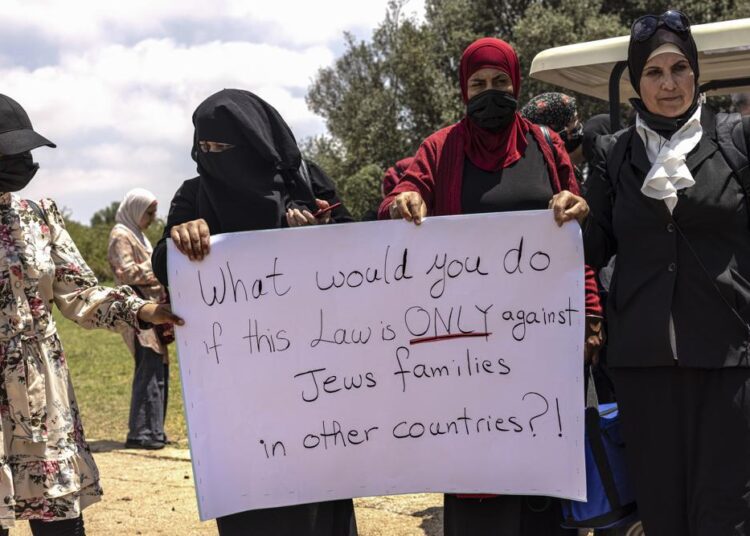TEL AVIV — Israel’s parliament early on Tuesday failed to renew a law that bars Arab citizens from extending citizenship or residency rights to spouses from the occupied West Bank and Gaza, in a tight vote that raised doubts about the viability of the country’s new coalition government.
The 59-59 vote, which came after an all-night session of the Knesset, marked a major setback for Prime Minister Naftali Bennett, according to AP.
The new Israeli leader, who had hoped to find a compromise between his hard-line Yamina party and the dovish factions in his disparate coalition, instead suffered a stinging defeat in a vote he reportedly described as a referendum on the new government.
The Citizenship and Entry into Israel Law was enacted as a temporary measure in 2003, at the height of the second intifada (uprising), when Palestinians launched a number of attacks inside Israel. Proponents said Palestinians from the occupied West Bank and Gaza were susceptible to recruitment by armed groups and that security vetting alone was insufficient.
Under it, Arab citizens, who comprise a fifth of Israel’s population, have had few if any avenues for bringing spouses from the West Bank and Gaza into Israel. Critics, including many left-wing and Arab lawmakers, say it’s a racist measure aimed at restricting the growth of Israel’s Arab minority, while supporters say it’s needed for security purposes and to preserve Israel’s Jewish character.
The law has been renewed annually and appears to have the support of a large majority in parliament, which is dominated by hard-line nationalist parties. But former Prime Minister Benjamin Netanyahu’s Likud Party and his allies decided to oppose it to embarrass Bennett and harm his coalition, which includes a collection of eight parties across the political spectrum, including a small Islamist Arab party.
Interior Minister Minister Ayelet Shaked, a member of Bennett’s Yamina party, said the opposition move to block the law’s renewal would lead to thousands more applications for citizenship. She accused Netanyahu and his allies of choosing “petty and ugly politics, and let the country burn.”
Amichai Chikli, a renegade member of Yamina who voted with the opposition, said the outcome was a sign of deeper issues.
“Israel needs a functioning Zionist government, and not a mismatched patchwork that is reliant on” the votes of Arab lawmakers, said Chikli. He was the only member of his party to oppose the new coalition-led government last month.
Netanyahu, ousted by the new coalition after 12 years as prime minister, made clear his political goals.
“With all due respect for this law, the importance of toppling the government is greater,” Netanyahu said Monday.
Bennett reportedly proposed a compromise with liberal members of the coalition that would have extended the law by six months while offering residency rights to some 1,600 Arab families, a fraction of those affected. But the measure was defeated, in part because two Arab members of the coalition abstained. The vote exposed the deep divisions and the fragility of the new government.
The decision, however, gave some hope to Arab families that have been affected by the law. The law has created an array of difficulties for thousands of Palestinian families that span the war-drawn and largely invisible frontiers separating Israel from east Jerusalem, the West Bank and Gaza, territories it seized in the 1967 war that the Palestinians want for a future state.






Discussion about this post